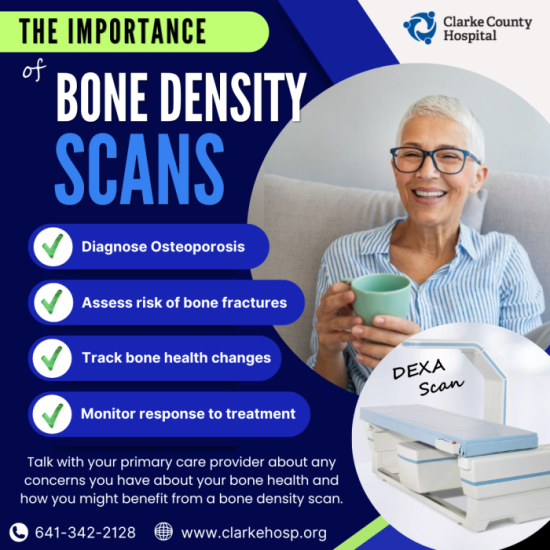The Importance of Bone Density Scans
May 31, 2024

A DEXA Bone Density Scan is a valuable diagnostic tool for assessing bone health and detecting conditions such as osteoporosis. A DEXA scan is a medical imaging test that uses low levels of X-rays to measure how dense your bones are. DEXA stands for "dual-energy X-ray absorptiometry."
Medical experts consider DEXA scans the most useful, easy, and inexpensive test for helping diagnose osteoporosis. The test is quick and painless. Osteoporosis is a condition characterized by weakened bones, making them more susceptible to fractures. DEXA scans measure bone mineral density, allowing healthcare providers to identify decreases in bone density early on. Detecting osteoporosis early allows for timely intervention and reduces the risk of fractures.
DEXA scans can also help determine an individual's risk of bone fractures. The results are interpreted using a T-score: a T-score of -1 or higher is considered normal, while a score of -2.5 or lower indicates osteoporosis. The range between normal and osteoporosis is called osteopenia, which also raises the risk of fractures. By assessing bone density, healthcare providers can tailor preventive measures and treatments to reduce fracture risk.
Healthcare providers usually recommend a DEXA scan to assess your bone health for osteoporosis and fracture risk if you are older than 50, have had a broken bone, or have other illnesses that put your bone health at risk. Research shows women start losing bone mass earlier and faster than men. Therefore, healthcare providers usually recommend women get a DEXA scan to screen for osteoporosis at younger ages compared to men.
Your provider may recommend a DEXA scan if you have one or more risk factors for osteoporosis or fractures:
- Increased age: Many individuals lose bone mass as they get older. The National Osteoporosis Foundation recommends people at average risk get a DEXA scan starting at 65 (women) and 70 (men).
- Family history: If one or more family members have had osteoporosis or more than one fracture, you could be at a higher risk for bone loss.
- Previous fracture injuries: Breaking a bone, especially after age 50, may indicate that you're at greater risk. Porous (less dense) bones break more easily.
- Medications: Some medications, such as the steroid prednisone, cancer drugs, and drugs used after an organ transplant can weaken your bones.
- Your overall health: Many chronic medical disorders can make your bones more likely to break. Risky conditions include rheumatoid arthritis, lupus, diabetes, liver disease and kidney disease.
Remember, maintaining healthy bones through exercise, proper nutrition, and regular screenings is crucial for overall well-being as we age. Talk with your primary care provider about getting a bone density test and discuss any concerns you have about your bone health. To schedule an appointment with your primary care provider at Clarke County Clinic, please call (641) 342-2128.